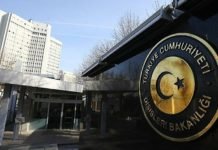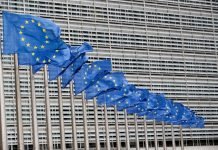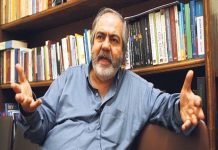The European Commission’s annual report on Turkey, released on November 4, warned of continued democratic backsliding and further deterioration in the rule of law and human rights, prompting sharp criticism from Ankara.
The report, which evaluates Turkey’s progress toward European Union membership and its alignment with EU legislation and democratic standards, pointed to persistent shortcomings in the functioning of democracy, the judiciary and the protection of fundamental rights.
It warned of weak separation of powers between the executive and the judiciary, along with extensive presidential authority that limits parliamentary oversight and undermines checks and balances. It also highlighted the further erosion of local democracy, noting that elected opposition mayors were prosecuted and removed from office, while public administration remains highly politicized.
The report warned that political pressure on the courts and prosecutors continued, that high-profile rulings of Turkey’s Constitutional Court were not implemented and that the country still refused to comply with binding judgments of the European Court of Human Rights (ECtHR).
The commission reported a deterioration in fundamental rights, including freedom of expression, as national security and counterterrorism laws continued to be used to suppress criticism and dissent. It stated that Turkey focused its anti-terrorism operations on the outlawed Kurdistan Workers’ Party (PKK), DAESH and the Gülen movement, emphasizing that the EU does not designate the movement as a terrorist organization.
Turkish President Recep Tayyip Erdoğan has been targeting followers of the Gülen movement, inspired by the late Muslim cleric Fethullah Gülen, since corruption investigations in December 2013 implicated him as well as some members of his family and inner circle.
Dismissing the investigations as a Gülenist coup and a conspiracy against his government, Erdoğan began to target the movement’s members. He designated the movement as a terrorist organization in May 2016 and intensified the crackdown on it following an abortive putsch in July of the same year that he accused Gülen of masterminding. The movement strongly denies involvement in the coup attempt or any terrorist activity.
The report also pointed out that Ankara continued to pressure Western Balkan countries to act against the Gülen movement and its alleged members, including calls for extraditions and the closure of affiliated schools and businesses.
Independent and opposition media outlets faced intensified judicial and administrative pressure, while journalists were subjected to arbitrary arrests and prosecutions during the reporting period. Turkey’s broadcast regulator, the Radio and Television Supreme Council (RTÜK), continued to lack independence and frequently imposed fines in a discriminatory manner.
The commission called on Turkey to release journalists and rights defenders held in pretrial detention, revise its criminal and media legislation and restore a safe, pluralistic environment for media.
The Turkish Foreign Ministry said the findings, released on Tuesday, were incompatible with efforts to build a “positive agenda” with the EU and ran counter to the long-term interests of both sides.
In the statement Ankara said it categorically rejected what it called “biased, prejudiced and baseless allegations” and described the report as politically motivated.
Despite the harsh tone on democratic standards, the report credited the government for improvements in Turkey’s economic management and said the country had reached an advanced level of readiness for a functioning market economy.
It also noted what it called a “constructive approach” by Ankara in the eastern Mediterranean and its recent improvement in relations with Greece, a long-time rival and fellow NATO member.
The Turkish Foreign Ministry welcomed those positive remarks and said they reflected “accurate findings” about the country’s economic stability and foreign policy efforts.
Ankara also urged the EU to lift restrictive conclusions adopted in 2019 that froze certain high-level meetings and funding, calling for Turkey’s involvement in European defense and security programs.
In the same statement Turkey accused the European Union of siding with Greece and the Greek Cypriot administration in the Cyprus dispute, calling the report’s references to those issues “unrealistic, unlawful and maximalist.”
The ministry said the EU must act impartially and stop letting bilateral issues “take [the broader relationship] hostage.”
Turkey’s EU accession process has been effectively frozen for years due to concerns over democratic backsliding, press freedom and the rule of law.
Ankara says it still views full EU membership as a strategic goal but blames what it calls political obstacles within the bloc for blocking progress.
Turkey applied for full EU membership in 1987 and was granted candidate status on December 10, 1999. Accession negotiations began on October 3, 2005. Out of 35 negotiating chapters, only 16 have been opened so far, and just one has been provisionally closed. No new chapters have been opened since 2016, and the negotiations have been at a standstill since 2018.
(Stockholm Center for Freedom with reporting by Turkish Minute)















